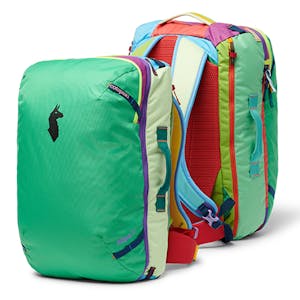Ben Kepes co-founded Cactus Outdoor 25 years ago. He’s proud to say everything they make is made in NZ. He discusses making gear to last, how not to sell your soul and Bangladeshi-made T-shirts.
Fashion label World recently made headlines for marketing Bangladeshi-made T-shirts as ‘Made in NZ’. What do you think about the debacle?
I remember when Icebreaker first went offshore, [founder] Jeremy Moon and I did a head-to-head on Radio New Zealand and it wasn’t about trying to curry favour for Cactus, it was just about honesty. I’m pretty keen on just telling the truth and I have no problem that Jeremy went offshore – he had to to get Icebreaker to the size it is today. But be honest about what you’re doing. It’s the same deal with World: it was just really dishonest in my view. It was bizarre.
Why have you chosen to manufacture in NZ?
BK: The reality is – and again it’s honesty – we aren’t big enough to do offshore manufacturing. You need to be at a size where you’re ordering 1000 of every garment for every size or style and we’re not at that point. But notwithstanding that, we’re really proud that we have kept really skilful people gainfully employed in New Zealand.
What do you think when you hear people complain about the cost of ‘Made in NZ’?
BK: It depends what you’re trying to do. We sell products that are super, super durable and are expensive because of that. You buy a pair of trousers for $250 but they will last you 10, 20 years. You can do that in NZ. If you’re trying to sell a pair of trousers for $100 that will wear out in five minutes, you’re hard-pressed to do that. Think about what business you’re in and what products you want to make.
Swazi founder Davey Hughes said the NZ apparel industry will be dead in two years. What’s your take?
BK: I don’t think it will be dead in two years because if you look at the graph there’s always a really long tail – it takes a long time for things to peter out. But it is getting harder and we’ve always said we are very passionate about making in NZ and we’re really keen to continue to do so, but our business isn’t predicated on that. If we had to go offshore, or we decided to go offshore, we’d do so. But the difference is, we’d be really honest about that and we wouldn’t try to pull the wool over customers’ eyes.
Has making your gear in New Zealand made business difficult?
BK: Business has been difficult for us for 25 years! We started about the same time Jeremy started Icebreaker and he just sold his business for $280m, and we certainly aren’t worth 1/100th of that. Having said that, the three people who own Cactus owned it way back when and own it now, and we’re happy that we do. We haven’t had to sell our souls, and I’m not saying Jeremy has sold his soul, but we’re really proud of what we do, we’re proud of Cactus. To build something that people genuinely love and believe in, without wanting to sound kind of airy-fairy, is kind of like a movement. That makes up for the fact that none of us is rich, I guess.
Former Macpac owner Bruce McIntyre is on the Cactus board. What does he bring to the company?
BK: He’s someone who has seen such amazing change in this industry. He grew Macpac from nothing to the point where it sold. He deeply understands product and manufacturing and I think he’s really in-tune with Cactus as a brand. He has a sense of unfinished business with Macpac. He didn’t really want to sell, he didn’t want to go offshore but he was in a position where he had to.
Your gear is renowned for being durable – its lifespan is measured in years. Is it good business to make gear that lasts so long?
BK: No, it’s totally not good business. I led a youth programme a few weeks ago and there was a girl there with a Cactus pack. It turns out it was her mother’s pack and was 22 years old. The straps had been replaced, it looked old, but it was still going strong. So no, it’s not fantastic business – we’ve probably made $80 out of her in 20 years. But it’s pretty cool to be able to do stuff that wears in and not out.








